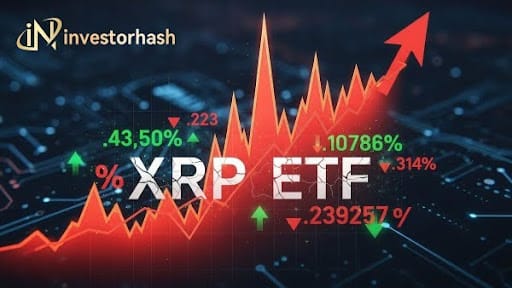Decentralization: The Key to Financial Freedom
�-majors-amid-institutional-adoption">Chainlink's LINK Outperforms Crypto Majors Amid Institutional Adoption
The decentralized oracle network Chainlink's native token LINK has seen impressive growth over the past day, surging over 10% while Bitcoin gained only 3%. This remarkable rally comes on the heels of several key partnerships between Chainlink and major traditional financial institutions like SWIFT and Australia and New Zealand Banking Group (ANZ).
These collaborations highlight the increasing appetite for decentralized finance solutions among legacy finance organizations. By integrating Chainlink's infrastructure, these institutions can unlock the potential of blockchain technology and accelerate the development of tokenized asset markets.
Many see the adoption of Chainlink's Cross-Chain Interoperability Protocol (CCIP) as a watershed moment for connecting different blockchains and ushering in an era of seamless cross-chain transactions. The question remains: Will decentralized finance fully disrupt traditional finance, or will both continue to coexist?
The Growing Reach of Decentralized Infrastructure
- Chainlink announced integration with SWIFT's interbank messaging system to scale tokenized asset adoption at Sibos conference.
- Partnership with DTCC processes much of trading in U.S. markets using Chainlink's CCIP.
- ANZ bank completed first cross-chain purchase of tokenized assets via CCIP and stablecoin A$DC.
- On-chain data shows large LINK transfers from Chainlink wallets to exchanges like Binance.
Decentralization: The Key to Integrating Crypto and Traditional Finance
Rather than seeing the growing collaborations between Chainlink and legacy institutions as an endorsement of centralized authorities, it should be viewed as a validation of the merits of decentralization. Chainlink offers a neutral infrastructure layer that allows traditional finance to interface with crypto's permissionless networks.
Decentralized protocols like Chainlink's oracles and CCIP offer the transparency, security and flexibility needed to build bridges between old and new financial rails. A decentralized backbone enables the best of both worlds, removing barriers to entry while retaining the stability offered by traditional systems.
True decentralization will always reign supreme in crypto. But integrations with legacy systems should be seen as a Trojan Horse - a means of demonstrating the superiority of open financial architectures from within.
How Bitcoin Fixes This
Bitcoin represents the embodiment of financial decentralization. Its permissionless, trustless and tamper-proof network offers the same neutral settlement layer that decentralized protocols like Chainlink provide.
In fact, Bitcoin's credibility as the first and most decentralized cryptocurrency rubs off on the legitimacy of the wider crypto ecosystem. Just as institutions are coming to appreciate the benefits of decentralized oracles, so too will Bitcoin's immutably scarce and programmable money become an increasingly attractive reserve asset.
Far from compromising crypto's decentralization ethos, integration with legacy finance simply sets the stage for Bitcoin and its peers to displace outdated centralized systems in the long run. The crypto revolution will not be centralized.
Parallels Between Crypto Adoption and Other Societal Shifts
The proliferation of decentralized technologies like Chainlink bears similarities to other technological innovations that fundamentally reshaped existing systems.
When the internet first emerged, many established companies were skeptical of exploring online capabilities. However, over time the immense value of digital connectivity became undeniable. Those who adapted early reaped the rewards.
Crypto's peer-to-peer cash system has echoes of Luther's protest against centralized religious authority. By removing intermediaries, Bitcoin transfers power from central banks to ordinary users. This shift toward decentralization may provoke resistance, but history shows its influence will eventually prevail.
The move from closed private blockchains toward open, permissionless ledgers like Ethereum also mirrors the transition from closed corporate intranets to the open internet we know today. Cryptonetworks need public participation to achieve network effects that maximize utility.
Will Decentralized Finance Disrupt Traditional Finance?
Decentralized finance (DeFi) offers significant advantages of transparency, accessibility, and programmability compared to traditional finance. However, decentralized solutions are unlikely to completely supplant existing systems, at least in the near term.
Realistically, DeFi and centralized finance will continue to coexist. DeFi expands options for certain services like lending or derivatives but cannot yet match the liquidity and institutional reach of centralized infrastructure. Many investors will use both centralized and decentralized options.
However, DeFi fundamentally shifts power and control from central intermediaries towards users. Over time, these advantages will drive increasing migration to decentralized options, steadily eroding reliance on centralized systems.
Can Bitcoin and Crypto Integrate with the Existing Financial System?
While full migration to decentralized finance will take time, Bitcoin and crypto are increasingly integrating within existing financial rails.
Partnerships between decentralized platforms like Chainlink and legacy institutions demonstrate crypto's ability to enhance current systems. Major banks now offer crypto services. Leading payment processors like Visa settle transactions via stablecoins.
Rather than disrupting traditional systems overnight, crypto is steadily demonstrating its utility to drive incremental adoption. In the long term, the immutable transparency of Bitcoin will make it an attractive global reserve asset. For now, integration drives legitimacy and accessibility among skeptical institutions.
The key is interfaces allowing interoperability between old and new systems during this transitional period. Increased integration will lead to exponential growth in decentralized finance. But Bitcoin's core ethos of decentralization will endure as its network continues growing in influence. The future remains bright.




